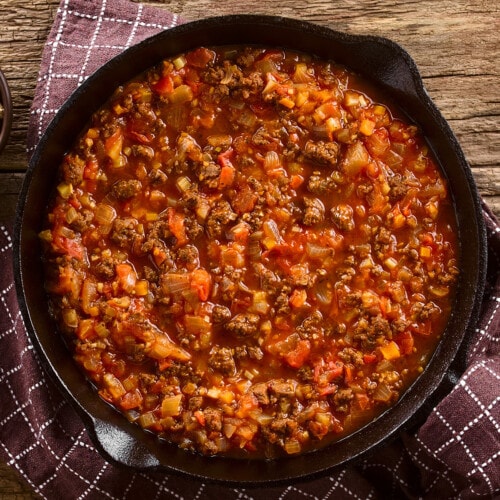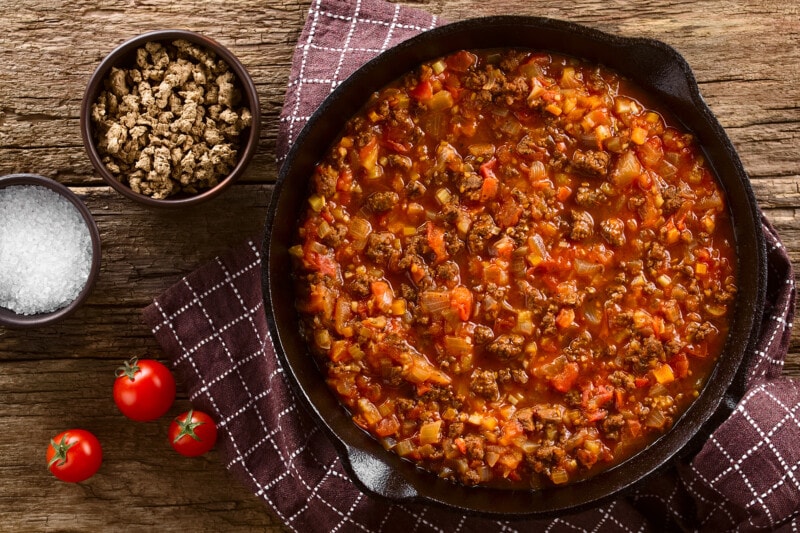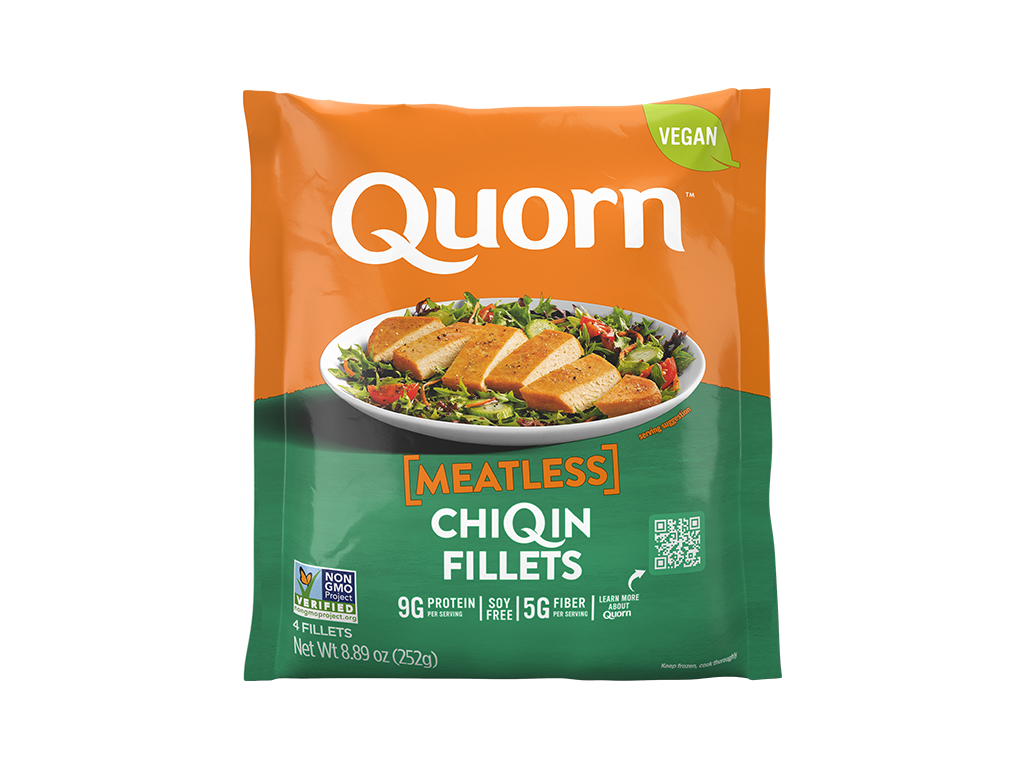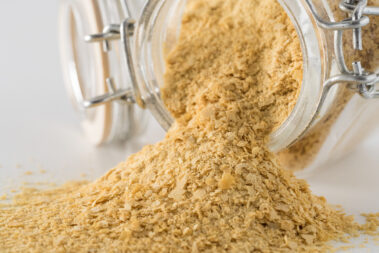Not that long ago, if you wanted to create a hearty meal while on a plant-based diet, your only choice was something made of highly processed soy protein.
Today, luckily, there are tons of great protein-packed bases for creating meat substitutes. And even more amazing brands using those bases to create some very tasty and naturally healthy products.
If you’re looking to broaden your horizons in the meatless meat world, we’re here to help.
Below, you’ll find 9 of the best vegan meat substitute bases that can be used to create some seriously deliciously meaty plant-based meals. Plus, we’ll give you our favorite product recommendations from each category so you know which brands are made with your health and taste buds in mind.
Table of Contents
9 Great Vegan Meat Alternatives
Each of these awesome protein-packed vegan meat substitutes can be used in their most basic form to create recipes from scratch. And many of them are utilized by the growing meat substitute industry to create ready-made products that take less work to prepare.
1. Tempeh
Tempeh is no newbie to the protein-packed plant product world. In fact, this soybean-based product has been used in Indonesia for thousands of years.
It’s made by cooking and fermenting whole soybeans and then packing them into a dense block or patty that can be easily sauteed, grilled, or crumbled and doused in barbecue sauce to create some delicious vegan sloppy joes.
Pros:
- High in protein
- High in fiber
- Some probiotic benefits
- Dense, chewy meat-like texture
- Less processed
That soybean base means tempeh has tons of protein to offer and contains all nine essential amino acids. It’s also loaded with fiber to help keep you regular and contains probiotics thanks to the fermenting it undergoes during creation. And of course, it’s loaded with health-supporting isoflavonoids.
Tempeh has a chewy texture and dense consistency that make it great for use in recipes that would normally call for ground beef. It can also be sliced thin and used to create some amazing vegan bacon strips.
Unlike a lot of meat alternatives, tempeh is not overly processed. This means it retains a lot of its natural enzymes and nutrients.
Cons:
- Have to prepare it
- Can be dry and/or bitter
- May not be gluten-free
- Contains some fat
Of course, one of the downsides of unprocessed plant-based meat substitutes is that you have to do more work to prepare them. Most tempeh you’ll find at the store doesn’t include marinades or seasoning. Some may have seeds or grains added to the mix before pressing, but this adds more to texture than to flavor and can mean the product isn’t gluten-free.
If you don’t prepare your tempeh correctly, which often requires boiling it first, it won’t absorb the flavors of the dish and you’ll be left with a bitter, bland, or dry final product.
Our Favorite Tempeh Brands
2. Lentils
Lentils are a type of legume prized for their chewy texture and neutral flavor. They make a great unprocessed addition to many meals that normally include meat, such as chili and enchiladas.
Pros:
- Rich source of protein
- Unprocessed
- Versatile
- High in fiber
Like other legumes, lentils are naturally high in protein. They’re also loaded with fiber which means they can help support healthy digestion and a balanced gut biome.
Legumes are also wonderfully versatile thanks to their neutral flavor. They pair well with a variety of sauces and seasonings. They can be eaten on their own or used in place of ground beef in many recipes.
And, since these tasty beans are completely unprocessed, you know you’re getting all the great vitamins and minerals they have to offer! Plus, they come in a variety of colors, all with slightly different textures and flavors.
Cons:
- Can cause gas
- Low in some amino acids
- No convincing meaty texture
Fiber is good, if your system can handle it. Lentils, more so than other beans, seem to give some people more digestive trouble and gas. And, despite having tons of protein, they are low in a few essential amino acids, so it’s best to pair them with grains to get everything you need.
While lentils are delicious, they aren’t going to fool anyone into thinking they’re eating meat. So, this meat substitute is best saved for your vegan friends.
Our Favorite Lentil Brands
3. Beans
Beans come in a wide variety of types, from the old standby black beans, to the texture powerhouses aduki beans and chickpeas. You can use beans to up the protein content of many vegan dishes, like quinoa bowls, or use them as a meat replacement to make your own burger patties.
Pros:
- High in protein
- High in folate
- Make you feel full
- Very versatile
- Unprocessed
All beans are high in protein and many are great sources of folate, or vitamin B9. Folate is turned into folic acid in the body and used to produce and maintain new cells. This vitamin is highly important during pregnancy and something to track closely if you follow a vegan diet.
Beans also have plenty of insoluble and soluble fiber to make you feel full. Plus, they are super versatile given how many different types of beans there are. Some lend themselves well to being squished up and made into vegan burgers, while others are chewy enough to mimic chicken in chicken salad, and some can be prepared to take the place of ground beef in many traditional meals.
Cons:
- Low in some amino acids
- No convincing meaty texture
Like lentils, beans are also low in certain amino acids. Preparing your beans with grains like rice or pasta, fills in the nutritional gaps nicely, however. But, no matter how you prepare them or which type you use, you aren’t likely to convince anyone they’re eating an animal-based meal.
The Best Beans for Meat Substitutions
4. Tofu
Like tempeh, tofu is a soy-based meat replacement that has been around for thousands of years. But instead of using whole soybeans, this product is made by curdling soy milk and pressing it into a block. This gives it a unique texture as far as “meat” goes, but also makes it incredibly versatile.
Pros:
- Low calorie
- High protein content
- Multiple uses
- Different types
Compared to tempeh, tofu is lower in calories but still packs a ton of plant-based protein and many vital minerals and vitamins. It’s also lower in fat and a great meat alternative for those trying to cut their calorie intake.
And because tofu comes in five different varieties from soft silken to dense super-firm, it can be used in a variety of situations. Silken tofu, for instance, makes a wonderfully convincing egg replacement for morning scrambles and breakfast burritos. Meanwhile, firm tofu can be cut to shape and flavored to mimic chicken, steak, ground pork, and more.
Cons:
- Requires some prep work
- Can be difficult to work with
- Has a bland flavor if not seasoned correctly
Of course, like other minimally processed non-meat options, tofu will require more work on your part. To get it to taste like a well-marinated or spiced piece of meat, you have to press the block to remove the water. Then you must prepare and cook it right so it absorbs enough flavors.
And because of all the different types available, it can be tough to find the right one for your needs and it can take some practice to learn how to work with it.
Our Favorite Tofu Types for Replicating Animal Protein
5. Mycoprotein
Maybe the least well-known of the meat substitutes, mycoprotein is starting to catch on in many vegan circles. Made from Fusarium venenatum, a naturally occurring fungus, this plant meat is much tastier than it sounds.
Pros:
- Loaded with nutrients
- Great source of protein
- Very convincing meat-like texture
- Less processed than many commercial meat substitutes
- Ready to cook
This special fungus is loaded with nutrients, including zinc and vitamin D, and has more protein per gram than chicken. But it takes far fewer resources to grow than livestock.
Most impressively, mycoprotein has a very meat-like texture and can be easily manipulated to replicate beef, chicken, sausage, and many other meat products. Despite this, it’s less processed than many commercial meat substitute products.
Cons:
- Not all options are vegan
- A little pricey
- Not always easy to find
Currently, there’s only one brand of mycoprotein-containing vegetarian products on the market, Quorn. And unfortunately, many of their products contain egg whites as a binder. But, they are slowly expanding their vegan product options.
Even still, these products can be a bit pricey and aren’t available at all grocery stores yet.
Our Favorite Vegan Quorn Products
6. Seitan
Seitan was first created by Buddhist monks back in the 7th century. Then, it was made by soaking wheat dough in water to isolate the protein, or vital wheat gluten. Today, this product can be made at home in much the same way, but is much more often processed in large commercial facilities and pressed into a variety of shapes to imitate real meat.
Pros:
- High in vegetable protein
- Available in many varieties
- Chewy meat-like texture
- Many products require little prep
Seitan is made by washing away the starch in wheat, producing a product that’s low in fat and carbs, and high in protein. This vital wheat gluten product has a chewy texture that very much resembles chicken or beef.
Many seitan products that you’ll find at the store have been pre-flavored and come in a number of different varieties to make your food prep super simple. You can also buy plain seitan and marinate it yourself.
Cons:
- Contains gluten
- Not a complete protein
- Many products are overprocessed
If you are sensitive to gluten or have celiac disease, then seitan is not for you. Even if you tolerate gluten well, it’s best not to eat this product every day as you could develop an allergy. This is especially true if you eat highly processed seitan products.
It’s also worth noting that seitan is not a complete protein. Like beans, it’s low in a few essential amino acids. Luckily, though, the ones it’s low in happen to be the ones beans have plenty of. This means that if you pair your seitan with legumes, you’ll get everything you need in one meal.
Our Favorite Seitan Meat Substitutes
7. Jackfruit
Jackfruit is a tropical fruit grown in Asia, South America, and Africa. It’s the largest fruit in the world and can grow up to 40 pounds. While very ripe jackfruit is somewhat sweet, less ripe varieties have a bland taste that pairs well with savory sauces.
Pros:
- Has a stringy texture like pulled pork
- Loaded with nutrients and phytochemicals
- Low in calories
- Not overly processed
Jackfruit is mostly made up of fiber and starch, which means it’s a fairly low-calorie meat substitute option. It has a naturally stringy texture with some chunky bits that allow it to perfectly imitate pulled pork. It’s also great for tacos and carnitas.
Because it comes by its meaty texture naturally, there’s no reason to over-process it, which means a lot of commercial jackfruit products are better for you than other fake meat options. Many retain all the great nutrients, phytochemicals, and antioxidants that make the fruit part of a healthy diet.
Cons:
- Low in protein
- Texture can be off-putting
- Use caution if you have certain allergies
One thing jackfruit doesn’t have that most other plant-based meats do is protein. Like other fruits, jackfruit contains some protein, but not a ton. Therefore, this is only a good meat substitute in terms of texture, not macronutrient profile.
While that texture is pretty dead-on for pulled or shredded pork, many find it off-putting once they learn it’s actually from a plant. Whether you like the texture or not you may want to avoid this meat fruit if you have a latex or birch pollen allergy as cross-reactions have been known to happen.
Our Favorite Jackfruit Brands
8. Pea Protein
Pea protein is a very useful product for those looking to ditch whey, casein, and other animal product-based protein powders. It’s also becoming more and more popular as a base in meat substitutes.
Pros:
- High in protein
- Soy and gluten-free
- Can be used to replicate many meaty textures
- Little preparation required
Pea protein naturally has a neutral flavor that can be mixed with a host of other ingredients to create all kinds of meat substitute products. Many of these creations are also gluten and soy-free which means more people can enjoy them.
Because pea protein isolate is made by washing away the starch in peas, it offers tons of protein without a lot of extra calories.
Cons:
- Included in many highly processed products
- Many products are high in sodium
- Best as an occasional indulgence
Because pea protein takes a ton of processing to resemble meat, it isn’t the best substitute to use as a daily indulgence. That processing often includes a ton of less-than-natural binders and fillers and an unhealthy heaping of sodium.
Our Favorite Pea Protein Packed Meat Alternatives
9. Soy Protein
Unlike tofu and tempeh, soy protein found in many plant-based alternatives is created by processing soy to wash away the starch. What’s left is highly useful soy protein isolate.
Pros:
- Very high in protein
- Can be used in a variety of recipes
- Little preparation required
Much like pea protein, soy protein can be processed in a number of ways to imitate various meat products. It’s often mixed with other ingredients and pressed into a mold to look and taste like anything from chicken to ground beef.
Most products that contain soy protein are ready to heat and already bursting with flavor, which makes the prep process a breeze.
Cons:
- Highly processed
- May be high in sodium
- Best as an occasional indulgence
Soy protein shares many of the same pitfalls as pea protein. These products are often highly processed and contain a lot of salt to add flavor. Products that aren’t all-natural may also contain artificial flavors and colors, as well as synthetic binders.
While these products may taste amazing and do a great job imitating meat, they are best saved for special occasions rather than representing a part of your daily diet.
Our Favorite Soy Protein Based Meat Substitutes
Make Your Own Vegan Ground Beef
The easiest meat substitutes to work with from our list above are tempeh and tofu. Each can be used interchangeably in many recipes to make seriously delicious and healthy meat substitutes right at home.
One of our favorite recipes using these soy products is this awesomely easy plant-based ground beef.

Vegan Ground Beef Substitute
Ingredients
- 2 blocks tofu extra firm, crumbled. Can also use tempeh
- ¼ cup tomato puree
- ¼ cup soy sauce
- 3 tbsp nutritional yeast
- ½ tbsp garlic powder
- ½ tbsp onion powder
- 1 tbsp smoked paprika
- 1 tbsp apple cider vinegar
- 1 tbsp hoisin sauce or maple syrup
Instructions
- Preheat the oven to 400F and line a baking sheet with parchment paper.
- In a mixing bowl, combine your crumbled tofu or tempeh with the rest of the ingredients. Mix until the sauces and spices are evenly distributed.
- Spread the crumbles across the lined baking sheet. The more evenly spread, the more evenly your vegan ground beef will cook.
- Bake for 20 minutes, then remove your sheet from the oven and mix the contents with a spatula. Place it back in the oven for an extra 10-15 minutes until your “beef” is a little crispy on the outside.






























